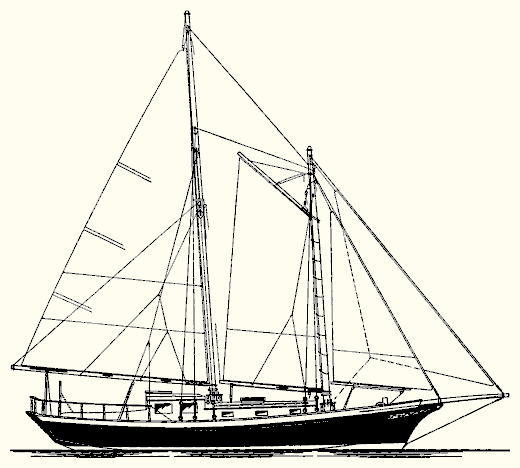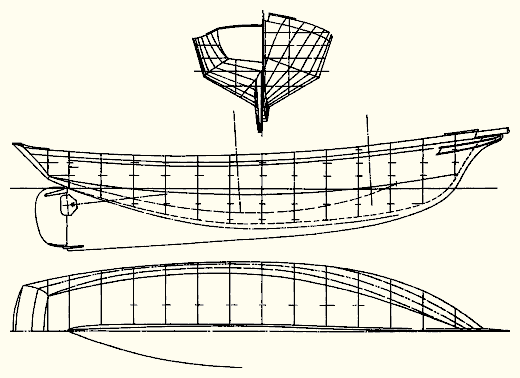| The schooner Island Princess was
conceived for comfortable cruising among the islands -- or anywhere -- and for
living aboard for extended periods. She will be quite at home when the going
gets rough. Her rather deep forefoot and long, straight drag will keep her on
the wind in good fashion. Relatively shoal draft will permit poking into
sheltered harbors and coves not accessible to her longer-legged sisters.
|

|
The sail plan and overall characteristics should
please the traditionalist�and find favor among seamen. Her lines are similar to
those of the 30-foot schooner Little Maid
of Kent whose design appeared in Motor Boating several years
ago. Like her smaller sister. Island Princess is of V-bottom form.
Her principal dimensions are 36' 7" over all by 29' 0" on the waterline by 10' 6"
breadth and 4' 9" draft. The freeboard is 3' 10" at the bow, 3' 3 3/4" aft and
2' 6" at station 9.
The schooner sail plan of Island Princess incorporates features
of design which tend to eliminate much of the expense associated with the modern
racing-cruising yacht. While her divided rig is not as efficient as those of her
more "high strung" sisters, the schooner rig has been well proved over the
years -- and continues, from time to time, to confound the experts and
proponents of the popular jib-head rig. The late George Steers brought the
schooner rig very close to perfection -- and his famed America
proved her remarkable windward ability at the expense of the best of Britain's
Royal Yacht Squadron.
None of the delicate tuning essential aboard competitive sailing yachts is
necessary aboard Island Princess. Her standing rigging, spliced in
eyes, parceled and served to prevent wear and tear, is quite acceptable.
Deadeyes and lanyards are in character with her rig�all quite in keeping with
the sea. There are obvious advantages in strong, simple gear, which can be
repaired or replaced at sea with simple tools -- not dependent upon the
shoreside machine shop. Island Princess has a total of 538 square
feet of sail area divided in mainsail, foresail, staysail and jib. The area is
of modest proportions to make for easier handling and yet provide good
performance. Lazyjacks are rigged on main and foresail -- a most practical piece
pf rigging which, unfortunately, has gone by the board in some modern
racing-cruising yachts.
|

|
Island Princess is arranged for the
comfort of four. Her galley is aft, with sink and ice chest to starboard -- stove
and work flat opposite. Some skippers, I find, tend to take a dim view of the
coal-burning stove, but it has been my experience that the warmth and comfort of
a galley range -- or solid fuel-burning device of some sort -- has a great deal
in its favor. Cold, damp days aboard are not uncommon. Adequate heating is often
desirable. Island Princess will have an alcohol or kerosene-burning
stove chocked on a suitable removable flush cover, fitted over the coal range,
for regular cooking -- and a fire laid in the range when the weather turns raw
will be welcome company.
A Gray Four-112, driving through a 2:1 reduction gear, will provide fine
auxiliary power. This engine develops 30 hp at a comfortable 2200 rpm.
|

|
| The lines of Island Princess show a
clipper-bowed hull of good proportions. She is designed to carry 4750 pounds of
outside lead with an additional 1200 pounds, in relatively small pigs, to be
distributed inboard. Primarily in the interest of appearance, her sections,
forward and aft, are molded�with flam introduced forward with an eye toward
keeping her dry. In the manner of many successful old-time yachts, her rudder
post is vertical -- a feature adopted in many successful yachts.
|
| While Island Princess is a departure
from the commonplace, and not developed with competitive racing in mind, her
traditional features have long provided comfort, ease of handling and safety at
sea. There is a great deal to be said for qualities like these -- qualities
indispensable to a boat of true character.
|
|

 PHOTOS OF ISLAND PRINCESS
PHOTOS OF ISLAND PRINCESS 


